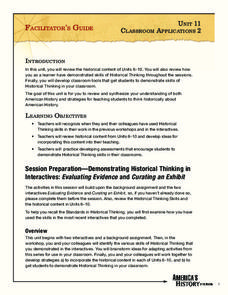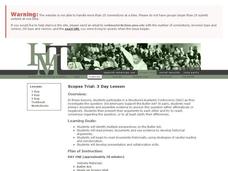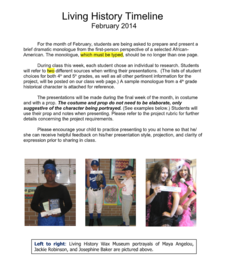Briscoe Center for American History
Applying the SOAPS Method of Analyzing Historical Documents
Young historians use the SOAPS (Speaker, Occasion, Audience, Purpose, Subject) method of questioning to determine the historical value of primary source documents. The third in a series of five lessons that model for learners how...
Museum of Tolerance
The Pursuit of Democracy and Diversity: The Trial of Pro-Social Injustice in Historical Documents and Accounts
Class members investigate The Indian Removal Act of 1830, U.S. Theft of Mexican Territory Timeline, and President Abraham Lincoln’s letter to Horace Greeley, 1862, and then conduct a mock trial of each of these documents to determine...
Historical Thinking Matters
Spanish-American War: 5 Day Lesson
Nine historical documents, an interactive online notebook, and a fantastic opportunity for historical inquiry await your pupils in this 5-day lesson plan. Class members identify and discuss various causes for the Spanish-American War...
Roy Rosenzweig Center for History and New Media
Founding Documents
Teach the class about the predecessor to Declaration of Independence—the Virginia Declaration of Rights. Using the foundational documents, scholars examine the two writings to consider how they are similar and how they are different. A...
Annenberg Foundation
America's History in the Making: Classroom Applications Two
Reading between the lines helps discover important information! The 11th lesson of a 22-part series on American history has scholars use historical thinking skills to uncover the deeper meaning behind the words on a page. Using backward...
Historical Thinking Matters
Rosa Parks: 3 Day Lesson
How can evidence and perspective challenge even the most well-known of stories? Through primary and secondary source analysis, think-alouds, and discussion, young historians evaluate the historical narrative of Rosa Parks across multiple...
Historical Thinking Matters
Social Security: 5 Day Lesson
Did the New Deal fundamentally shift the role of the American government in the economy? Your class members will examine the interpretations of various historians in answering this question, and use a variety of primary and secondary...
Mr. Roughton
Roman Empire
Does the United States parallel the Roman Empire in any way? Young historians work with four documents in order to answer this query as part of a structured DBQ assignment.
Mr. Roughton
Late Middle Ages Dossiers
Young detectives are given the "clues" to investigate whether King John should be remembered as a poor ruler of England, particularly in comparison in King Richard. They analyze historical informational texts and work in...
Curated OER
Liberty for All: Voices from the Revolution
Did the Declaration of Independence really intend to grant liberty for all? Get your class thinking about historical perspective with documents relaying the experiences of women, white men, and African-Americans during the Revolutionary...
TCI
Picking Rusty Gold: Why Do People Buy and Sell Antiques?
Your historical sleuths will work to research the in-depth history of chosen artifacts and will use their research to design a fictional advertisement for an early 20th century item.
Newseum
From the Front Page to the History Books
Young journalists compare news coverage of four major events with how the same events are covered in historical accounts. The ensuing discussion asks class members to compare and contrast the role of a reporter and the role of a historian.
Curated OER
Unit 1: Building Historical Background Knowledge: The Road to Revolution 1754–1776
What were the conditions that led to the American Revolution? What are the conditions that lead to revolution in other times and places? Class members examine primary source materials and use evidence drawn from these documents to craft...
Historical Thinking Matters
Spanish-American War: 3 Day Lesson
Why did the United States choose to invade Cuba in 1898? As part of a 3-day lesson, your young historians will first develop working hypotheses to answer this question, then work with a variety of historical primary source documents that...
Historical Thinking Matters
Social Security: 1 Day Lesson
Should the United States provide relief for those who are unemployed? Trace this question back to the Great Depression with your young historians, who will engage in careful reading of historical documents and classroom discussion...
Curated OER
Decoding US Foreign Policy: The Iran-Contra Affair
This is a really good lesson plan. Learners explore US Foreign Policy, the Reagan Administration, and the Iran-Contra Affair through various documents and readers theater. Worksheets, script, and web links are all included. Teaching...
National Endowment for the Humanities
The Argument of the Declaration of Independence
When in the course of a course on historic American events, it becomes necessary for learners to examine, with decent respect, the Declaration of Independence, it becomes evident that there are six separate and equal parts of that...
Museum of Tolerance
Documents That Shape Society
The Bill of Rights is a foundational document of American democracy, much like the Nuremberg Laws were a foundational document of the Reichstag of Nazi Germany. But that's where their similarities end. Engage high schoolers in a...
Encyclopedia Britannica
Presidential Electability
There are specific constitutional requirements that candidates must meet to become president of the United States. In addition, there are societal opinions that affect a candidate's electability. Class members examine historical...
Curated OER
The Movement Before the Movement: Civil Rights Activism in the 1940s
Many educators focus on the civil rights movement as it occurred after Rosa Parks incited the bus boycott. Extend the understanding of the fight for civil rights in the United States with this post-WWII lesson. Learners examine and...
Historical Thinking Matters
Scopes Trial: 1 Day Lesson
Why did many Tennesseeans support the 1925 Butler Act, which forbade the teaching of evolution? Using several primary source documents and a brief video clip, your young historians will draw connections between the broader historical...
Historical Thinking Matters
Scopes Trial: 3 Day Lesson
Was the Scopes trial more complicated than a simple debate between evolutionists and creationists? As part of a structured academic controversy (SAC) activity, pupils consider multiple perspectives of the Butler Act and engage in close...
Center for Civic Education
Historical Analysis of Constitutional Amendments
Each of the 27 Amendments to the U.S. Constitution were adopted within specific economic, political, social or cultural, and international contexts. As part of their Constitution Day/Week studies, seniors investigate these factors for...
Brockman Elementary School
Living History Timeline
As part of a living history research project, learners research a chosen historical figure that they will study and physically represent in a gallery walk. This resource includes a project description, letter to parents,...























